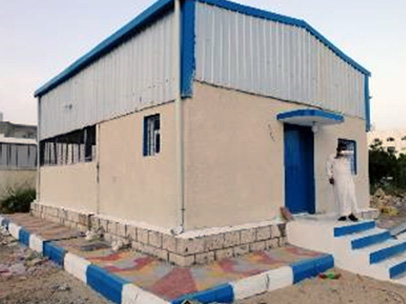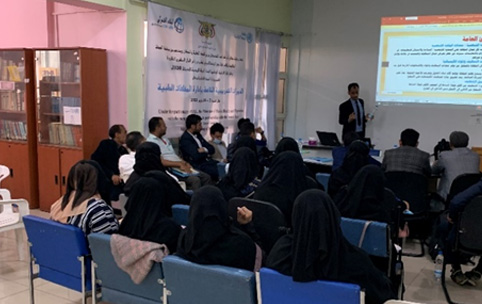A mother’s struggle: fighting malnutrition in Yemen
 14 April 2025, Aden, Yemen – At just 5 months old, Amir Taher Ali has already endured more than any child should. Born in Salah Al-Din, Aden, he has battled severe acute malnutrition, a chest infection, persistent diarrhoea and an umbilical hernia that needs surgery.
14 April 2025, Aden, Yemen – At just 5 months old, Amir Taher Ali has already endured more than any child should. Born in Salah Al-Din, Aden, he has battled severe acute malnutrition, a chest infection, persistent diarrhoea and an umbilical hernia that needs surgery.
His mother remembers the helplessness she felt as his health deteriorated. “He was so sick and no matter what I did, I couldn’t comfort him. My milk dried up because of the stress. I felt completely helpless,” she says. “Now, at least, he is receiving care. I just want him to be healthy again.”
After struggling at home, Amir was eventually brought to the therapeutic feeding centre where he is now receiving treatment.
“The doctors and nurses have been kind, and I see him improving. But I pray no other mother has to watch her child suffer like this.”
A daily struggle
Life for Amir’s family has never been easy. His father, a daily wage worker, earns barely enough to buy food. On some days there is nothing to eat.
“When that happens, we fast,” his mother says quietly. “A stranger gave us baby clothes when Amir was born. We have always relied on the kindness of others.”
Malnutrition in Yemen: a widespread crisis
 Amir is one of 2.3 million children in Yemen suffering from acute malnutrition. Half a million of them face severe acute malnutrition and 69 000 need urgent medical care. Without treatment, malnutrition leaves children vulnerable to infections like pneumonia and diarrhoea, among the leading causes of child deaths in Yemen.
Amir is one of 2.3 million children in Yemen suffering from acute malnutrition. Half a million of them face severe acute malnutrition and 69 000 need urgent medical care. Without treatment, malnutrition leaves children vulnerable to infections like pneumonia and diarrhoea, among the leading causes of child deaths in Yemen.
With support from the German Foreign Office, WHO is working to save lives. It provides medical care to 31220 malnourished children at 96 stabilization centres, and is training 1546 health care workers to ensure more children get the treatment they desperately need.
“Malnutrition remains one of the biggest threats to children’s health in Yemen,” says Acting WHO Representative in Yemen Dr Ferima Coulibaly-Zerbo. “No child should have to suffer from hunger or preventable diseases. With the support of our partners, WHO is committed to ensuring that children receive the care and nutrition they need to survive and thrive.”
While Amir’s journey is not over, his mother refuses to lose hope. “I just want to take him home healthy. That is every mother’s wish.”
Building a brighter future for Yemen’s mothers and babies
 7 April 2025, Sana’a, Yemen – On World Health Day 2025, the World Health Organization (WHO) is raising the alarm about the dire state of maternal and neonatal health in Yemen. Under the theme Healthy beginnings, hopeful futures, WHO is underscoring the urgent need for scaled-up interventions to save lives and protect the well-being of Yemen's most vulnerable.
7 April 2025, Sana’a, Yemen – On World Health Day 2025, the World Health Organization (WHO) is raising the alarm about the dire state of maternal and neonatal health in Yemen. Under the theme Healthy beginnings, hopeful futures, WHO is underscoring the urgent need for scaled-up interventions to save lives and protect the well-being of Yemen's most vulnerable.
Decades of conflict and a spiraling humanitarian crisis have decimated Yemen's health system. The statistics paint a stark picture of suffering and loss:
maternal mortality reached 183 deaths per 100 000 live births in 2020, a devastating regression in maternal health outcomes;
preventable complications such as haemorrhage and pre-eclampsia/eclampsia remain leading causes of maternal deaths, claiming the lives of women who should be experiencing the joy of motherhood;
prematurity, asphyxia, pneumonia and sepsis contribute to unacceptably high neonatal mortality rates; and
malnutrition and anaemia are rampant among women of reproductive age, jeopardizing their health and the health of their babies.
"The reality for mothers and newborns in Yemen is heartbreaking," says acting WHO Representative in Yemen Dr Ferima Coulibaly-Zerbo. "Behind these statistics are stories of immense hardship and loss. On this World Health Day, we cannot accept this as the status quo. We must act decisively and with unwavering commitment to ensure healthy beginnings and pave the way for hopeful futures.'"
WHO Yemen works tirelessly with health partners to deliver critical support and implement lifesaving interventions, including:
strengthening surveillance systems to better understand and respond to maternal deaths;
improving the quality of care in health facilities, ensuring access to skilled birth attendance and emergency obstetric care;
providing essential medicines, equipment and supplies to health facilities;
training and supporting midwives and other health care providers; and
addressing malnutrition through screening, counseling and supplementation programmes.
The scale of the crisis demands an urgent response. WHO Yemen is calling on the international community to increase funding for maternal and neonatal health interventions, for the government and health authorities to prioritize and strengthen the health system and all stakeholders to work together to overcome barriers to access and ensure that every mother and newborn receives the care they need.
"The future of Yemen depends on the health and well-being of its mothers and children," says Dr Coulibaly-Zerbo. "Let World Health Day 2025 be a turning point, a moment when we collectively resolve to protect and invest in hopeful futures for all Yemenis."
Media contacts
WHO Yemen Communications
Email:
About WHO
Since 1948, the World Health Organization (WHO) has been the United Nations agency dedicated to advancing health for all, so that everyone, everywhere can attain the highest level of health. WHO leads global efforts to expand universal health coverage, direct and coordinate the world’s responses to health emergencies and connect nations, partners and people to promote health, keep the world safe and serve the vulnerable.
Harnessing Solar Power: A Lifeline for Yemen’s Hospitals
 2 January 2025, Sana’a, Yemen – More than 50% of homes in Yemen rely on solar power, a vital energy source in a country that has faced almost a decade of conflict and disruptions to its power grid.
2 January 2025, Sana’a, Yemen – More than 50% of homes in Yemen rely on solar power, a vital energy source in a country that has faced almost a decade of conflict and disruptions to its power grid.
With support from WHO and other partners, hospitals and other health facilities are increasingly turning to solar as a sustainable energy source.
Throughout the conflict and ensuing humanitarian crisis, WHO, with the support of the World Bank and other partners, has provided monthly supplies of emergency diesel fuel to more than 100 hospitals to power generators so that essential services can be delivered to vulnerable communities but the supplies, which exceed 7 million litres of fuel every year, only partially meet the needs of facilities.
Solar energy stands out as a sustainable solution for Yemen’s healthcare sector, with the country enjoying over 3,000 hours of clear skies annually. By harnessing this abundant resource, hospitals can reduce their dependence on fossil fuels and improve their resilience to power disruptions.
WHO Representative to Yemen Dr Arturo Pesigan explained the organization’s approach: “With support from the WHO Centre for Environmental Health Action (CEHA), the WHO Country Office has initiated pilot projects in several hospitals to introduce solar power”.
Al Rawda Maternity and Children’s Hospital in Sana’a serves over 62,000 people and sees 360 patients daily. Thanks to WHO’s intervention, solar power now meets 80% of the hospital’s surgical department energy needs. Dr. Sukainah Alkebsi, the hospital’s director, shared, “This has transformed how we operate, ensuring uninterrupted surgeries even during power outages. We hope this vital support continues.”
The Director of Al Rawda Hospital Dr Sukainah Alkebsi described the impact of WHO’s intervention: “We serve a large population, and WHO support of the surgical operations department has resulted in 80% of the department’s energy needs being sourced from solar. We hope this support will continue.”
Yemen faces intensifying climate challenges, including rising temperatures, reduced rainfall, and more extreme weather. In 2024, flooding impacted over 500,000 people, while persistent outbreaks of climate-sensitive diseases like cholera, dengue, and malaria underscore the urgent need for adaptation.
The impacts of climate change are already being felt. Flooding affected over 500 000 people in 2024; Cyclone Tej caused an estimated US$ 570 million in economic losses in 2023, and the country has faced persistent outbreaks of climate-sensitive diseases such as cholera, dengue and malaria.
In response, WHO is ramping up collaborations with Yemen’s health, environment, and water ministries to strengthen health sector resilience. Solar projects, training health workers, and community awareness campaigns are pivotal to these efforts, enabling facilities to better withstand climate shocks.
Learn more:
Action by WHO, the World Bank and health authorities transforms medical waste management in Yemen
 2 January 2025, Aden, Yemen – Safely managing medical waste has been a critical challenge amid Yemen’s ongoing conflict. However, innovative investments and consistent reinforcement of good practices by WHO, the World Bank, and local health authorities are transforming this essential process, protecting communities and the environment.
2 January 2025, Aden, Yemen – Safely managing medical waste has been a critical challenge amid Yemen’s ongoing conflict. However, innovative investments and consistent reinforcement of good practices by WHO, the World Bank, and local health authorities are transforming this essential process, protecting communities and the environment.
Eight years ago, Yemen’s health facilities were engulfed by untreated medical waste, with broken disposal systems threatening public health and safety. In response, WHO and the World Bank embarked on a transformative partnership to overhaul waste management systems across the country.
To address this, WHO designed – in consultation with the World Bank – a low-cost waste treatment unit model, including a plastic shredder and burial pits under units for ashes, sharps and non-sharp waste. WHO then led community consultations and developed environmental and social management plans for each facility where a unit would be installed. After the World Bank cleared the plans, WHO led the contracting and installation, and training to ensure proper use and maintenance of the units.
As of 2024, WHO has installed 60 waste treatment units in Yemen, revolutionizing waste management in 139 of 170 health facilities under the EHCP. Compared to just 20% of facilities with functional systems eight years ago, today, over 81% are equipped to manage waste safely.
Regular monitoring under the EHCP has driven significant improvements. By 2024, compliance with best practices had increased to 91%, thanks to WHO’s proactive measures such as on-site visits, direct communication with facility managers, and collaboration with local authorities.
To promote full compliance, WHO takes constant proactive action. This has included writing to authorities to seek enforcement of good waste management practices on 4 occasions in 2024. Meetings with central and governorate authorities are held at least annually to update and revisit environmental and social standards. In addition, WHO calls between 10 and 25 health facility managers every quarter when issues arise. Whenever security protocols allow, WHO staff from different teams visit facilities to monitor project implementation and follow-up on activities.
 WHO regularly provides critical infection prevention supplies, including personal protective equipment, safety boxes, and segregated garbage bins. These provisions ensure that health workers can implement waste management protocols effectively, safeguarding both patients and staff.
WHO regularly provides critical infection prevention supplies, including personal protective equipment, safety boxes, and segregated garbage bins. These provisions ensure that health workers can implement waste management protocols effectively, safeguarding both patients and staff.
Since 2022, WHO has trained over 8,000 health workers to integrate environmental and social standards (ESS) into their daily routines. One trainee remarked, “This training has empowered us to protect our environment while improving patient care.”
ESS has been integrated in WHO technical programmes in Yemen on quality of care and hospital resilience. Quality teams established in EHCP hospitals include a waste management focal point who monitors the situation regularly. In line with the WHO Hospital Safety Index, disaster management committees in a growing number of facilities assess the situation and seek to remedy any waste management issues, using hospital budgets. This includes, for example, ensuring that sharps safety boxes are available in all departments.
Moving forward, WHO, in collaboration with the World Bank, will intensify its support for health facilities, ensuring compliance with waste management protocols and ESS. This includes expanding monitoring coverage, enhancing local capacity, and fostering partnerships to achieve universal safe waste disposal across Yemen’s health sector.








